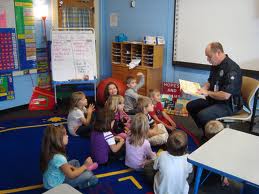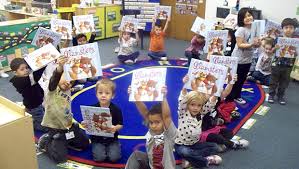

When I was in school, I remember enjoying my Literature and English classes the most, but I especially looked forward to the classes where the teachers allowed us students to be involved creatively. Some teachers had us take turns reading from our desks, and some had us translate scenes into skits that we performed in front of class. I also enjoyed writing analytical papers on material that we were reading (unheard of, I know) which probably explains why I ended up pursuing theatre.
 Despite the fact that I am an actress, I was never the greatest fan of older dramatic literature, such as William Shakespeare. I personally felt bored reading it— sometimes the language was tedious to attempt to understand, and often left me with nothing but heavy eyelids. However, when we watched Shakespeare movies or plays, I was wide-awake and frequently chuckling! I also performed (twice) in A MIDSUMMER NIGHT’S DREAM and I had a ball. I am not saying that teachers should cease giving lectures on this material, but that teachers should implement a variety of creative analysis tools in the classroom, especially with plays. Below are a few ways students can apply their own imaginations while studying dramatic literature.
Despite the fact that I am an actress, I was never the greatest fan of older dramatic literature, such as William Shakespeare. I personally felt bored reading it— sometimes the language was tedious to attempt to understand, and often left me with nothing but heavy eyelids. However, when we watched Shakespeare movies or plays, I was wide-awake and frequently chuckling! I also performed (twice) in A MIDSUMMER NIGHT’S DREAM and I had a ball. I am not saying that teachers should cease giving lectures on this material, but that teachers should implement a variety of creative analysis tools in the classroom, especially with plays. Below are a few ways students can apply their own imaginations while studying dramatic literature.
Plays are meant to be performed
 We have all heard this expression, so it is beneficial to have your class act out some scenes in the play. This is remarkably more fun if the students are outgoing, but if the class as a whole is introverted, it can be challenging. In the latter case, have the students work in groups to write a new scene for the play. The scene can take place before, in-between, or after the playwright’s storyline. This will display the students’ comprehension of the play as a whole since they will have to understand the characters and the plot to be able to write a scene that makes sense with what they have been given by the playwright. They may still opt to spoof the characters or revise their language to make it more modern, but teachers will still be able to see how well the class comprehends the literature. When the project is complete, groups should have the option of performing their new scenes in front of the class or reading from their desks.
We have all heard this expression, so it is beneficial to have your class act out some scenes in the play. This is remarkably more fun if the students are outgoing, but if the class as a whole is introverted, it can be challenging. In the latter case, have the students work in groups to write a new scene for the play. The scene can take place before, in-between, or after the playwright’s storyline. This will display the students’ comprehension of the play as a whole since they will have to understand the characters and the plot to be able to write a scene that makes sense with what they have been given by the playwright. They may still opt to spoof the characters or revise their language to make it more modern, but teachers will still be able to see how well the class comprehends the literature. When the project is complete, groups should have the option of performing their new scenes in front of the class or reading from their desks.
Create a comic book
 Have students work in groups to adapt the play into a comic book. This is a fun activity for the students, and it exhibits their comprehension of the play’s major themes. If students are not confident in their drawing abilities, remind them that the most important aspect of the project is their ideas.
Have students work in groups to adapt the play into a comic book. This is a fun activity for the students, and it exhibits their comprehension of the play’s major themes. If students are not confident in their drawing abilities, remind them that the most important aspect of the project is their ideas.
Transform the language into a rap
Take a scene (preferably from a Shakespearean play) and spend some time discussing the meaning of the lines. Once the class understands the basic meaning, have them work in groups to create a contemporary rap version of the scene or soliloquy. After the students are finished writing, they can take turns presenting their raps to the class.
Character Profiles
 Understanding and identifying with characters is essential in any reading comprehension, especially when reading plays. Ask the class to write a profile for one of the characters in the story. Have them describe their character’s personality. What goals and dreams does the character have? What is their character fearful of? Some educators have had students create My Space profiles and blogs for their characters on the Internet, but knowing that not all teachers have reliable access to computers or the Internet, creating a profile poster can be fun as well! When the class is finished with the project, display the posters around the classroom for the students to refer to and observe when they have free time.
Understanding and identifying with characters is essential in any reading comprehension, especially when reading plays. Ask the class to write a profile for one of the characters in the story. Have them describe their character’s personality. What goals and dreams does the character have? What is their character fearful of? Some educators have had students create My Space profiles and blogs for their characters on the Internet, but knowing that not all teachers have reliable access to computers or the Internet, creating a profile poster can be fun as well! When the class is finished with the project, display the posters around the classroom for the students to refer to and observe when they have free time.
These are only a few examples of activities educators can use to make dramatic literature more enjoyable for students to study. You can come up with your own ideas, or find some online. Regardless of the activity, take comfort in the fact that by incorporating creativity into the lesson, every student will benefit in some way (whether they are shy or extroverted). Analyzing the language of old dramatic literature is difficult and tedious enough simply sitting there reading and pondering at a desk. Take advantage of the times when you can allow the class to collaborate in groups and display the results of their analytical work.

 Random Item
Random Item